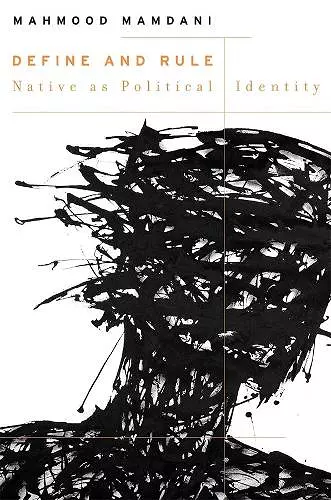Define and Rule
Native as Political Identity
Format:Hardback
Publisher:Harvard University Press
Published:29th Nov '12
Currently unavailable, and unfortunately no date known when it will be back

In Define and Rule, Mahmood Mamdani considers the empire of so-called 'indirect rule' and argues that, far from being a weak state, as has long been assumed, indirect rule embodied a distinctly modern political rationality. This book is a much-needed historiographic and contemporary-political intervention. It is vintage Mamdani: erudite, pathbreaking, and a profound challenge to conventional wisdom. -- Nasser Hussain, author of The Jurisprudence of Emergency: Colonialism and the Rule of Law
When Britain abandoned its attempt to eradicate difference between conqueror and conquered and introduced a new idea of governance as the definition and management of difference, lines of political identity were drawn between settler and native, and between natives according to tribe. Out of this colonial experience arose a language of pluralism.
Define and Rule focuses on the turn in late nineteenth-century colonial statecraft when Britain abandoned the attempt to eradicate difference between conqueror and conquered and introduced a new idea of governance, as the definition and management of difference. Mahmood Mamdani explores how lines were drawn between settler and native as distinct political identities, and between natives according to tribe. Out of that colonial experience issued a modern language of pluralism and difference.
A mid-nineteenth-century crisis of empire attracted the attention of British intellectuals and led to a reconception of the colonial mission, and to reforms in India, British Malaya, and the Dutch East Indies. The new politics, inspired by Sir Henry Maine, established that natives were bound by geography and custom, rather than history and law, and made this the basis of administrative practice.
Maine’s theories were later translated into “native administration” in the African colonies. Mamdani takes the case of Sudan to demonstrate how colonial law established tribal identity as the basis for determining access to land and political power, and follows this law’s legacy to contemporary Darfur. He considers the intellectual and political dimensions of African movements toward decolonization by focusing on two key figures: the Nigerian historian Yusuf Bala Usman, who argued for an alternative to colonial historiography, and Tanzania’s first president, Mwalimu Julius Nyerere, who realized that colonialism’s political logic was legal and administrative, not military, and could be dismantled through nonviolent reforms.
In Define and Rule, Mahmood Mamdani considers the empire of so-called ‘indirect rule’ and argues that, far from being a weak state, as has long been assumed, indirect rule embodied a distinctly modern political rationality. This book is a much-needed historiographic and contemporary-political intervention. It is vintage Mamdani: erudite, pathbreaking, and a profound challenge to conventional wisdom. -- Nasser Hussain, author of The Jurisprudence of Emergency: Colonialism and the Rule of Law
Mamdani’s book raises critical queries of colonial intervention in the lives of the colonized and how they are articulated in their theories to look upon themselves, and to take on their political and historical nativist subjectivities. Couched in the simple idiom of an astute political analyst, the academic-cum-theoretician has produced a thesis of nativism and counter theory that is bound to lead on to new intellectual grounds and initiate newer debates. -- Murali Sivaramakrishnan * The Hindu *
ISBN: 9780674050525
Dimensions: 191mm x 127mm x 18mm
Weight: 295g
168 pages